Martyrs and memory

The systemic targeting and killing of intellectuals and professionals during the nine-month-long Liberation War of 1971 was a calculated effort to annihilate the foundations of freedom in what is Bangladesh today. Albert Camus once wrote, "Freedom is nothing but a chance to be better." The victims and targets of this selective genocide either aspired to or had the potential to improve the nation. The Pakistani junta and their local collaborators executed the plan to separate the brain from the body of resistance. On the eve of their impending defeat in 1971, the occupying forces unleashed a killing spree with an aim to break the intellectual backbone of a nascent nation.
Over 200 educators, journalists, artists, doctors and engineers were abducted and murdered in the killing fields across the city of Dhaka, particularly in Mirpur and Mohammadpur, on the night of December 14, 1971. Maj Gen Rao Farman Ali made a list of 3,000 intellectuals, according to a diary later discovered in the governor's house. The total number of slain intellectuals is around 1,000. The Washington Daily News described this atrocity as "Slaughter in East Pakistan" in its editorial on June 15, 1971, noting, "Naturally, the military regime of President Yahya Khan denies it is committing selective genocide. But evidence mounts that it is cold-bloodedly murdering minority Hindus, Bengali separatists, intellectuals, doctors, professors, and students—in short, those who could lead a self-governing East Pakistan."
The positioning of Martyred Intellectuals Day just hours before Victory Day highlights the paradoxical entanglement of suffering and triumph, of sorrow and joy. It symbolises the crucible of sacrifice that is required for a greater positive change. The price of freedom was paid through immense individual and collective loss both before and during the Liberation War. The pattern is echoed in the student-led mass uprising in July-August 2024. The irony is, in 1971, the fight was for freedom against an occupying regime. In 2024, the fight was to reclaim intellectual and moral freedom from an increasingly oppressive regime that was our own. At this critical juncture in history, we must reassess our core values as a nation. The sacrifices of 1971 laid the foundation of hope for generations to come. The martyrs of 2024 stand on the shoulders of those in 1971. Both occasions have left indelible scars on our national psyche. They can impart powerful lessons in resilience and unity.
The systematic annihilation of intellectuals in 1971 and the violent repression of students in 2024 typify trauma that poses, in Cathy Caruth's phrase, a "crisis of truth." Our nation's collective tragedies have caused a rupture in the continuity of experience that defies rational explanation. How can we explain the fact that the party that guided us through the Liberation War in 1971 could turn against its own people with such cruelty? There is a growing sense of betrayal that fosters anger and sorrow. The feeling can only change into a new sense of purpose among survivors: a rallying cry for justice and freedom.
Remembering the martyred intellectuals at the intersections of 1971 and 2024 bears profound significance. While the annual commemoration ritual promises therapeutic succour, it also reopens wounds that remain unhealed. The logical course of action is to uphold the ideals for which these martyrs gave their lives: justice, equity, and intellectual freedom.
Frustration over the erosion of meritocracy and the monopolisation of opportunities by nepotistic elites motivated the Generation Z youth, who led the July uprising. What began as a demand for fair reform quickly evolved into a larger movement for justice and accountability. The parallels between the Liberation War and the 2024 uprising resonated deeply with the public, expressed through memes, slogans, and graffiti. The historical Six-Point Demand font was repurposed to write a nine-point demand that called for a singular goal: the ousting of an oppressive regime.
One of the iconic martyrs of the July uprising, Abu Sayeed, poignantly posted on Facebook the night before his tragic death at the hands of police, expressing a longing for the presence of Syed Mohammad Shamsuddoha, a university proctor who sacrificed his life in 1969 shielding students from Pakistani army bullets. The memory connects the present with the past. The night before one of the martyred intellectuals, Dr Fazle Rabbee, was abducted, his wife dreamt of her family visiting a tomb in Mecca. The physician interpreted it as his impending death and shared his premonition with his family. These anecdotes serve as a reminder of the human side of sacrifices, often overlooked in the tally of figures and numbers.
We should use Martyred Intellectuals Day as an opportunity to meaningfully engage with their memories. We should try to discern the symbolic significance of such personal and collective loss. More importantly, we should use the day to remind us of the peril of viewing freedom as an inherited gift that we can take for granted. Protecting freedom requires vigilance and sacrifice. Freedom is not only a political entity. It has intellectual, cultural, and moral dimensions. Then again, we will be doing a disservice to the countless ordinary people, without whose sacrifice these movements would never have been possible. While focusing solely on intellectuals, it's important to remember that during the Liberation War, the majority of participants were peasants. Similarly, ordinary men and women, facing significant challenges, bravely battled to reform the system, thereby bolstering the student-led mass uprising in 2024. Highlighting a part without recognising the whole can present a history with many holes.
The onus is on the leaders who are backed by students. Celebrating the contributions of specific groups may risk appearing selective. For greater unity of the country, we need "re-membering"—a process of collective recollection that shapes our identity as a nation. Forgetting the sacrifices of our martyrs would mean losing sight of our essence as a people.
History takes on different forms as it unfolds, revealing new opportunities and challenges with each era. The triumphs of 2024 are moments of both pride and sorrow, standing on a foundation built by the sacrifices of 1971. The intellectuals who perished laid the groundwork for every subsequent victory, providing a moral compass to guide the nation through its struggles. To disrespect their legacy would be to undermine the very foundation of Bangladesh's identity. By critically engaging with history and freeing it from monolithic narratives, future generations can carve out their own stories, standing firm against oppression while championing intellectual freedom and justice.
Dr Shamsad Mortuza is professor of English at Dhaka University.
Views expressed in this article are the author's own.
Follow The Daily Star Opinion on Facebook for the latest opinions, commentaries and analyses by experts and professionals. To contribute your article or letter to The Daily Star Opinion, see our guidelines for submission.

 For all latest news, follow The Daily Star's Google News channel.
For all latest news, follow The Daily Star's Google News channel. 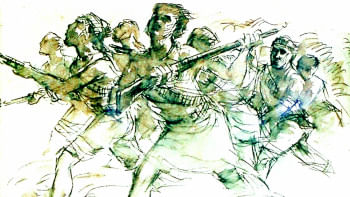
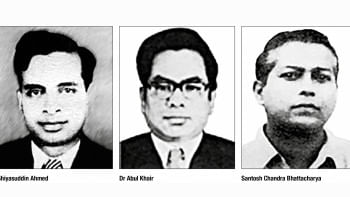
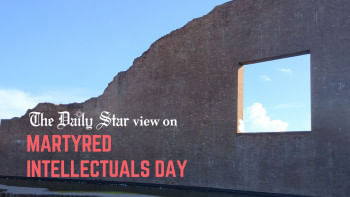


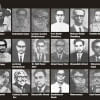

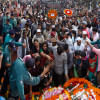
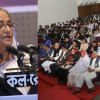
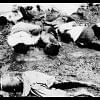


Comments